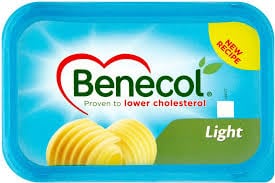UK food safety authorities yesterday backed Unilever’s novel foods application to expand the range beyond into liquid vegetable fats, saying no over-consumption issues were raised by the initiative.
Phytosterols are approved for use in margarines, yoghurt and milk drinks, salad dressings, milk-based fruit drinks, soy drinks, cheeses, spicy sauces and rye bread across the European Union’s 288 member states.
“We have submitted a novel foods application for cooking and baking products with added plant sterols because a wider range of products will increase consumer choice, making it easier for those who wish to lower their cholesterol to meet the desirable plant sterol intake levels as part of a healthy and balanced diet," a Unilever spokesperson told us.
In its draft opinion the UK Food Standard Agency (FSA) Advisory Committee on Novel Foods and Processes (ACNFP) said concerns the expansion could push consumption levels into dangerous territory were not substantiated.
“The Committee was content that the safety of phytosterols per se had already been demonstrated and the proposed changes in use were unlikely to result in sustained consumption beyond 3g/day,” the ACNFP wrote.
It added that it, “accepted that the net increase of POPs [phytosterol oxidation products] was not significantly different to the existing uses of phytosterols and did not present a safety concern.”
In its application Unilever pointed to clinical data showing safe use up to daily consumption of 9 g per day. The European Food Safety Authority (EFSA) has established a safe upper limit of 3 g.
The Dutch-anglo food giant said a worst-case scenario showed phytosterol intakes of 5.4 g per day among 19-30 year olds if they replaced all margarine used in spreads and cooking and baking products with phytosterol products.
The ACNFP is calling for input into the draft opinion until the end of the month. It could soon be mandated across the EU under the simplified EU novel foods procedures that validate novel foods approvals across the bloc once approved by the competent authority in one member state.

Main sector rival, Raisio-owned Benecol, employs phytostanols which do not require novel foods approval as the ingredient was already on the market before May 1997, when EU novel foods rules kicked into play. Benecol already includes home cooking and baking oils.
Both can make EU-backed, cholesterol-reduction claims under the nutrition and health claims regulation (NHCR), but the market for the products has been flat for several years, despite the claim validation.
High-dose
In a separate matter, an EC committee affirmed this month that daily intakes of between 2.6 g and 3.4 g for both plant sterols and stanols could reduce LDL cholesterol levels by 11.3% after 2-3 weeks of use.
The standard article 14 disease risk factor reduction claim under the nutrition and health claims regulation (NHCR) states 1.5-3 g/d of stanols and sterols can reduce LDL-cholesterol by an average of 10 % in those with moderate cholesterol issues.
Pro.activ
Euromonitor puts the global market for sterol-stanol products at about €2.45bn with Unilever’s pro.activ brand and Raisio’s Benecol brands the runaway leaders. Raisio engages in brand licensing to others like McNeil Nutritionals while Pro.activ appears under Unilever brands like Flora and Becel in different countries.
For the Pro.activ brand alone, Euromonitor noted that between 2007 and 2012, spreads had increased in sales from €309m to €394m. Its yoghurt-based products fared less well, sliding from €124m to €104m. Overall the range was worth about €500 in 2012.
